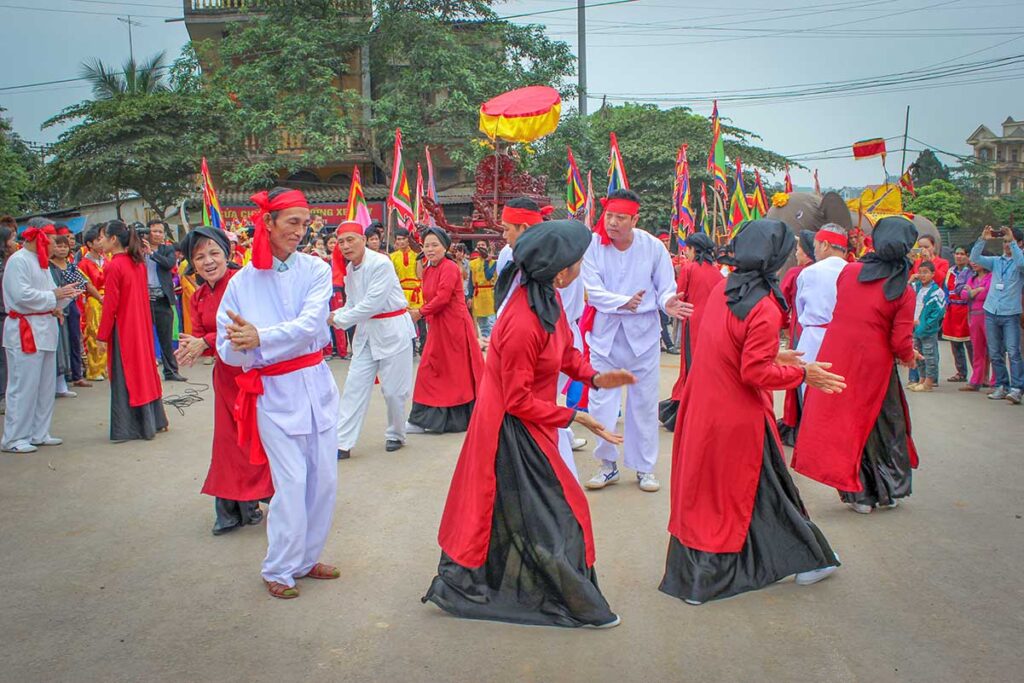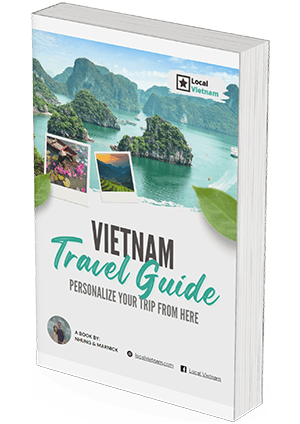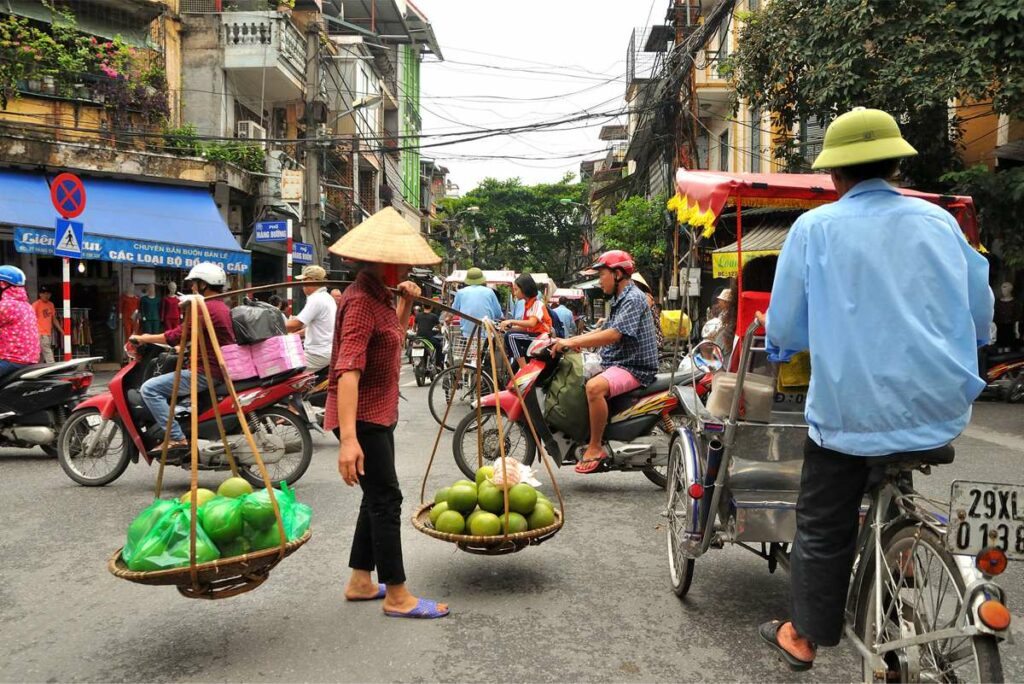Origins of Hanoi’s events and holidays
Hanoi’s calendar is shaped by a mix of influences that reflect Vietnam’s long and complex history. Many celebrations are deeply tied to religion and ancestor worship, while others commemorate important victories or national milestones. In recent decades, international holidays have also found their place in the city, creating a diverse blend of traditional and modern events.
Religious events
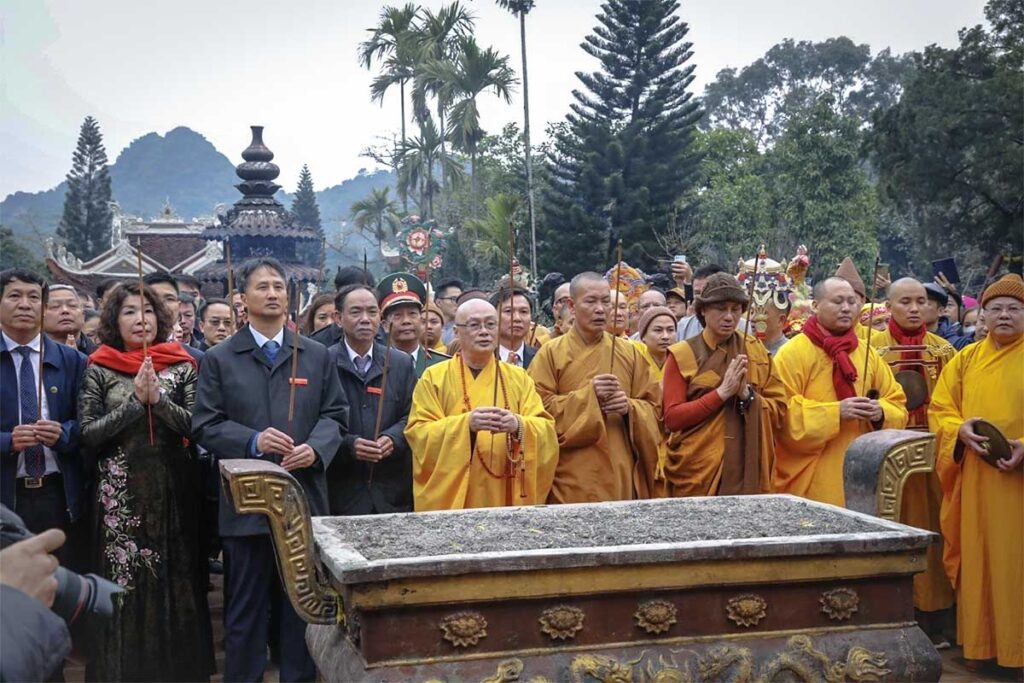
Religion plays a central role in many of Hanoi’s festivals. Buddhism is the most visible influence, with pagodas across the city hosting ceremonies such as Buddha’s Birthday (Vesak) and Vu Lan (a day of filial piety and ancestor remembrance). Folk religion is equally important, blending local beliefs, hero worship, and respect for natural spirits. This is why temples and pagodas are not only places of worship but also the main stages for major festivals, where rituals mix with cultural performances and community gatherings.
Historical celebrations
Several of Hanoi’s most significant holidays are tied to history and national pride. Days like Reunification Day (30 April) and Hanoi Liberation Day (10 October) commemorate modern events, especially linked to the Vietnam War and the country’s reunification. Others go much further back, such as the Hung Kings Festival, which honors the mythical founders of the Vietnamese nation. These events are less about religious ritual and more about remembering heroes, victories, and the struggles that shaped today’s Vietnam.
Western influences
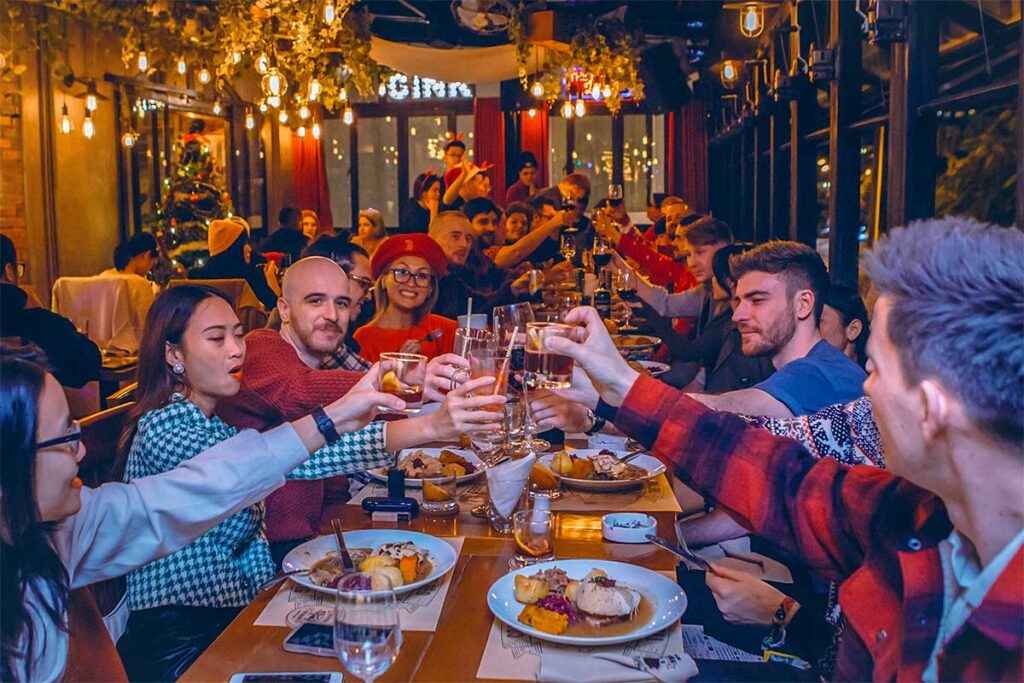
Alongside traditional festivals, Hanoi has also adopted a number of international celebrations. Christmas and New Year’s Eve are now widely marked in the city, especially in commercial areas, with decorations, dinners, and countdown events. Valentine’s Day and International Women’s Day are also popular, though they’re celebrated more in urban centers than in rural towns, where many people may barely acknowledge them. It’s worth noting that Vietnam has its own versions of some of these occasions, such as Tet (Vietnamese New Year) being far more important than Western New Year, and Vietnamese Women’s Day in October carrying more meaning than the international one.
Vietnamese calendar explained
One thing that often confuses travelers is why some holidays in Hanoi happen on fixed dates while others shift each year. The reason is that Vietnam uses both the Western (solar) calendar and the traditional lunar calendar. Knowing the difference helps you understand why celebrations like Reunification Day are always on the same date, while Tet or Mid-Autumn can fall in different months from one year to the next.
Solar (Western) calendar
Vietnam follows the international solar calendar for most official national holidays. Days like Reunification Day (30 April), International Labour Day (1 May), and National Day (2 September) always fall on the same date each year. These are public holidays, which means offices and schools close, and sometimes there are parades or fireworks in Hanoi. For travelers, this is straightforward—dates don’t change, so planning around them is easy.
Lunar calendar
Many of the biggest cultural and religious festivals, however, are based on the lunar calendar. This is why Tet (Vietnamese New Year) sometimes falls in late January and other times in February, or why the Mid-Autumn Festival might be in late September or early October. Other events like Buddha’s Birthday, Vu Lan, and Ghost Month also follow lunar dates. For visitors, this means you can’t assume the same timing every year. If you’re planning a trip around one of these celebrations, it’s worth checking the exact dates before booking flights or hotels. Even locals look up the lunar calendar each year to confirm when the major festivals will take place.
Hanoi Festival & Holiday Calendar (Overview by Month)
Here’s a quick look at when the main festivals and holidays in Hanoi take place. Some are fixed on the Western calendar, while others follow the lunar calendar and shift each year. This overview gives you an idea of what to expect each month, before we go into detailed descriptions later in the guide.
January
- Giong Festival
- Co Loa Citadel Festival
- Dong Da Festival
- Tet preparations (if Tet falls in late January or early February)
February
- Tet (Vietnamese New Year, sometimes late Jan/early Feb)
- Perfume Pagoda Festival (starts)
- Bat Trang Pottery Village Festival
- Hai Ba Trung Temple Festival
- Vong La Festival
March
- Perfume Pagoda Festival (continues)
- Thay Pagoda Festival
- Le Mat Village Festival
April
- Hung Kings Festival
- Reunification Day (30 April)
May
- International Labour Day (1 May)
- Buddha’s Birthday (Vesak)
June
- Occasional smaller cultural or local temple events
July / August
- Vu Lan Festival
- Ghost Month (7th lunar month)
- Tan Vien Son Thanh Festival
September
- Vietnam National Day (2 September)
- Mid-Autumn Festival (usually September or early October)
October
- Hanoi Liberation Day (10 October)
November
- Minor temple events and seasonal harvest ceremonies
December
- Christmas
- Western New Year’s Eve
Festivals & Holidays in Hanoi in detail
Below you’ll find a month-by-month breakdown of the major festivals and holidays in Hanoi. Each section explains what the event is about, where it happens, what you can realistically expect as a traveler, and some practical notes to help you plan.
Giong Festival
The Giong Festival honors Saint Giong, a legendary hero who defended Vietnam against foreign invaders. It takes place at Soc Temple in Soc Son District, just outside Hanoi. Travelers will mostly see traditional rituals, processions, and folk performances. It’s recognized by UNESCO, but it’s very local and can feel repetitive if you don’t have a guide explaining the symbolism. Expect big crowds of domestic pilgrims rather than tourist-oriented activities.
Co Loa Citadel Festival
Held at the Co Loa Citadel in Dong Anh District, this festival commemorates King An Duong Vuong, who built Vietnam’s ancient capital here. The main draw is the historic setting and traditional Quan Ho folk singing and games. Foreign visitors may find the ceremonies difficult to follow, but it’s interesting if you enjoy seeing local heritage celebrated in its original setting.
Dong Da Festival

This festival marks Emperor Quang Trung’s victory over Chinese invaders at the Battle of Ngoc Hoi–Dong Da in 1789. It takes place at Dong Da Mound in central Hanoi. Expect processions, dragon dances, and martial displays. It’s short and not highly touristy, but it gives you a glimpse into how modern history is remembered in the capital.
Tet – Vietnamese Lunar New Year
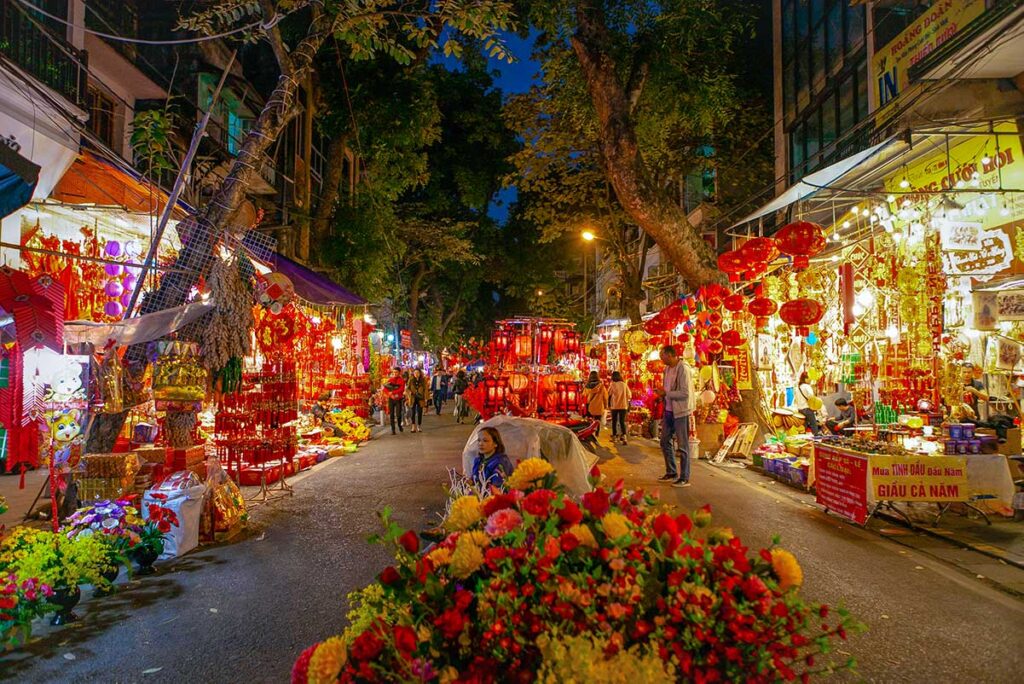
Tet is Vietnam’s biggest celebration, usually falling in late January or early February. In Hanoi, the days before Tet are busy and colorful, with families shopping and decorating. During the holiday itself, many businesses close for several days, and the city becomes much quieter. For travelers, it’s both a unique cultural experience and a logistical challenge. More details here: Vietnamese New Year in Hanoi.
Perfume Pagoda Festival
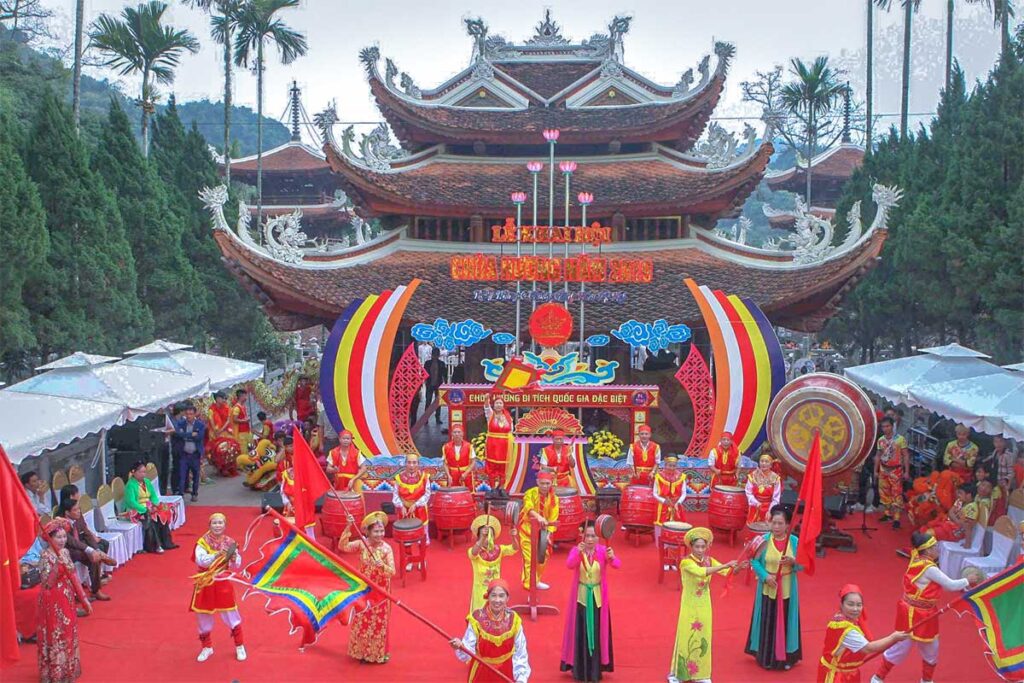
Running from the 6th day of the lunar new year until late March, this is the country’s largest Buddhist pilgrimage. The festival is centered at Perfume Pagoda, about 60 km southwest of Hanoi, and includes a boat trip on the Yen River followed by a climb to the pagodas. The first weeks are extremely crowded, while later dates are calmer. As a visitor, it’s a mix of impressive scenery and chaotic crowds. Full guide here: Perfume Pagoda Festival.
Bat Trang Pottery Village Festival
Held in Gia Lam District, this festival celebrates the craft traditions of Bat Trang. Expect processions, prayers, and community activities, alongside pottery-making demonstrations. As a tourist, it’s more meaningful if you’re already interested in ceramics.
Hai Ba Trung Temple Festival
In Ha Loi Village, Me Linh District, this festival honors the Trung Sisters, heroines who fought against Chinese rule in the first century. It features parades, folk games, and offerings. Travelers may find it mostly a local event but interesting if combined with a cultural trip outside central Hanoi.
Vong La Festival
A smaller festival in Dong Anh District with parades, Quan Ho folk singing, and lion dances. This is not a major tourist event but shows how smaller communities maintain traditions.
Thay Pagoda Festival
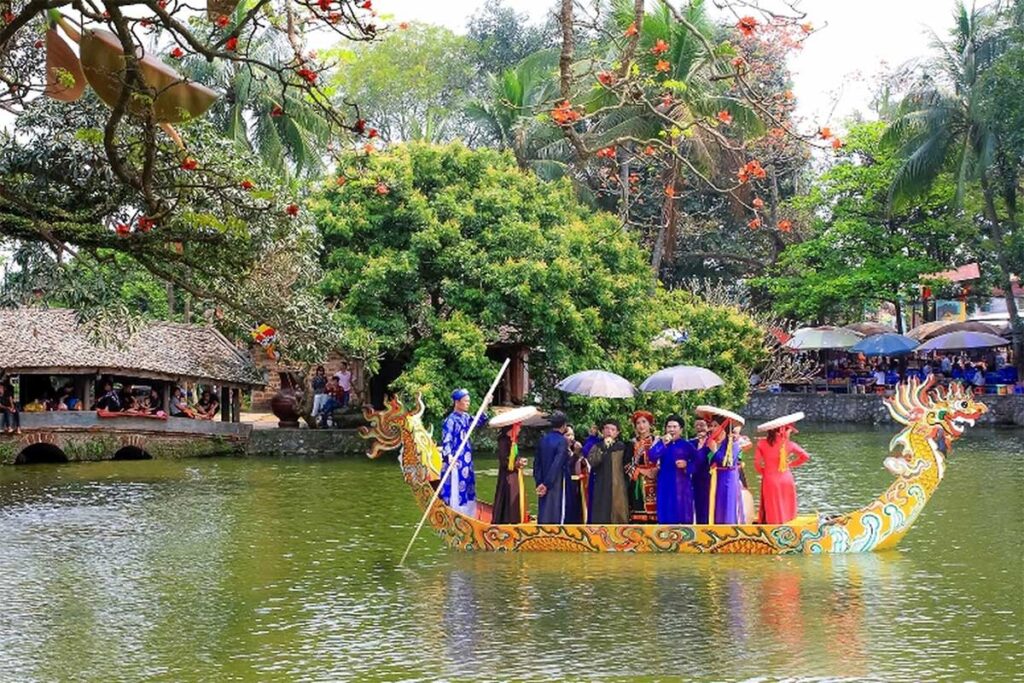
Held in Quoc Oai District, about 30 km from Hanoi, this festival at Thay Pagoda honors Tu Dao Hanh, a Buddhist monk associated with water puppetry. Expect ceremonies, folk performances, and water puppet shows. It’s worth visiting if you’re already interested in Hanoi’s traditional arts.
Le Mat Village Festival
On the 13th day of the third lunar month, Le Mat Village in Gia Lam hosts its famous snake festival. Highlights include the “snake dance” and dishes made from snake meat. For tourists, it’s an unusual and very local experience, but not for everyone—especially if you’re uncomfortable with animals being used in rituals and food.
Hung Kings Festival
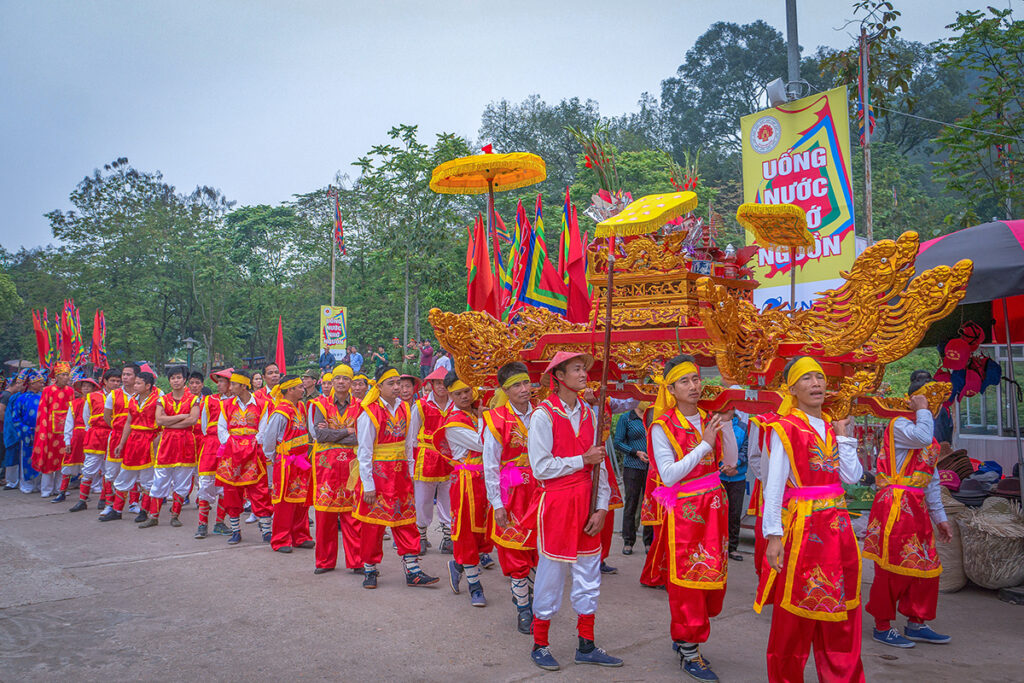
This festival honors Vietnam’s legendary founders, the Hung Kings. The main ceremonies are held at Hung Temple in Phu Tho Province, about 100 km from Hanoi, but smaller ceremonies happen at temples in the city as well. Travelers can join in ancestor worship ceremonies, but most foreign visitors experience it best as a day trip. More here: Hung Kings Festival.
Reunification Day (30 April)
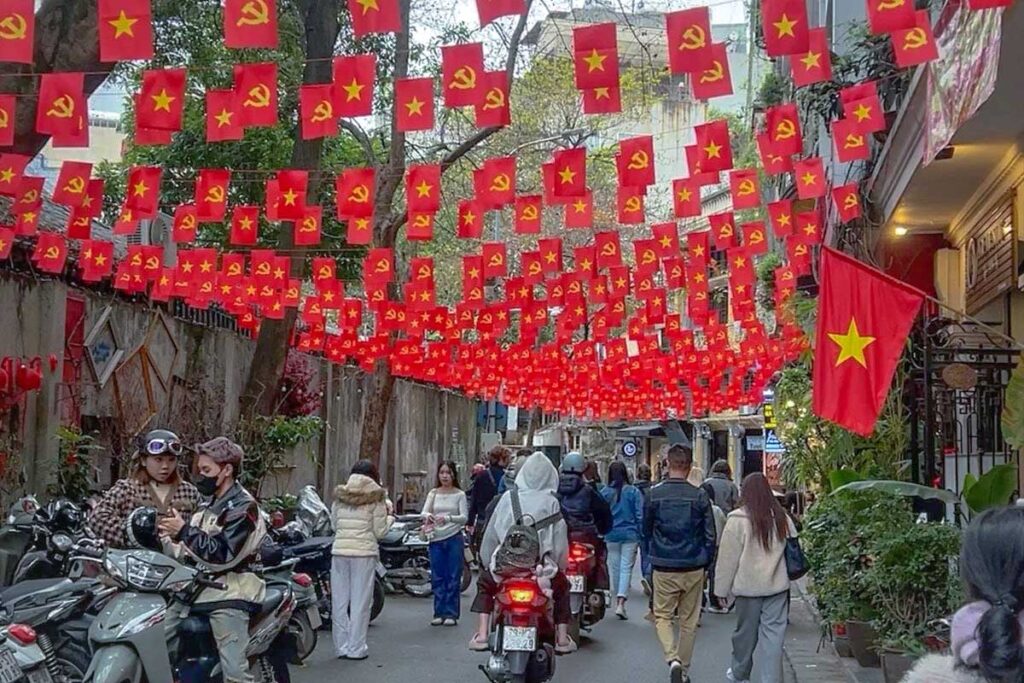
This public holiday marks the end of the Vietnam War in 1975. In Hanoi, expect flags, banners, and some events around Hoan Kiem Lake. Many locals use the long weekend to travel, but not usually within the city. Combined with Labour Day, it’s one of the biggest holiday periods of the year.
International Labour Day (1 May)
Comes directly after Reunification Day, creating a long holiday period. Offices and schools close, and many locals leave Hanoi for family trips. For visitors, it mostly means busy transport hubs and higher hotel demand in tourist destinations outside the city.
Buddha’s Birthday (Vesak)
Usually in May, this is one of Buddhism’s most important holidays. Temples in Hanoi, especially large ones like Quan Su Pagoda, hold ceremonies and decorate with lanterns and flags. As a traveler, it’s a peaceful time to visit temples, though they’ll be busier than usual.
Vu Lan Festival
Known as the Buddhist day of filial piety, Vu Lan is when families honor their ancestors and parents. Temples are busier, and you’ll see people making offerings. As a visitor, it’s more of an atmosphere than an event to join, but it gives insight into family traditions.
Ghost Month (7th lunar month)
Falling across August or September, Ghost Month is when people believe spirits wander freely. Families burn joss paper on the streets, so you’ll often see small fires and offerings. For tourists, it’s not a festival to participate in but something you’ll notice in daily life.
Tan Vien Son Thanh Festival
Held in Ba Vi District, this festival honors the Mountain Saint, one of Vietnam’s “Four Immortals.” It features rituals and processions but is mostly a local event.
Vietnam National Day (2 September)
Commemorates Vietnam’s declaration of independence in 1945. In Hanoi, expect flags, banners, and sometimes fireworks or concerts at Hoan Kiem Lake. It’s not as festive as Tet, but it’s a major patriotic holiday.
Mid-Autumn Festival
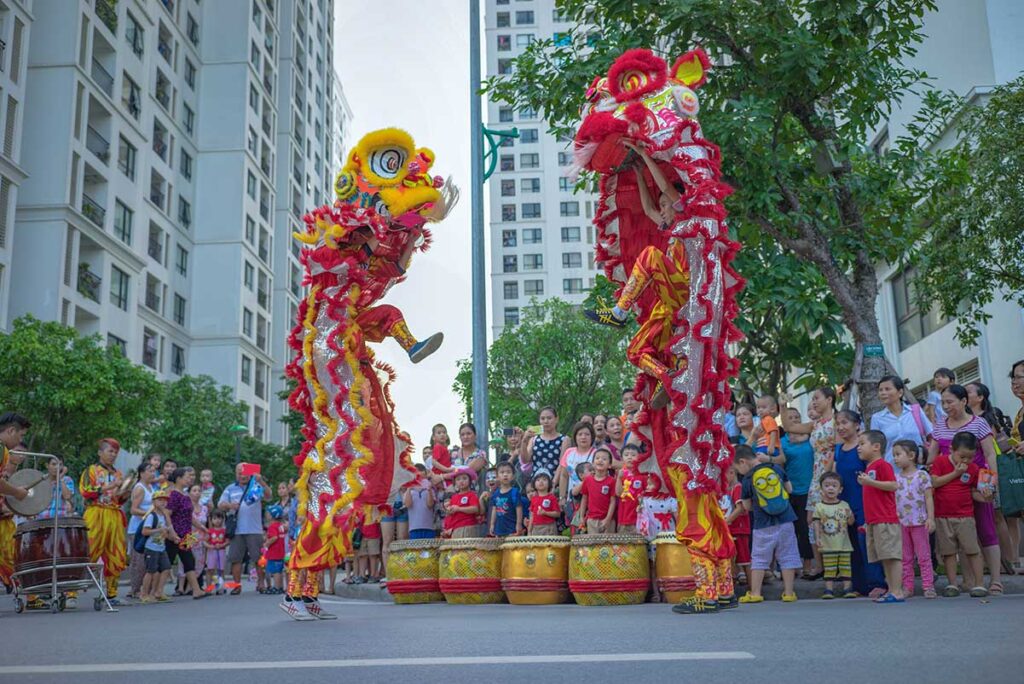
One of the most atmospheric celebrations in Hanoi, especially for children. Streets, especially in the Old Quarter, fill with lanterns, toys, and mooncakes. Expect heavy crowds at night. It’s colorful and lively, though chaotic. More details here: Mid-Autumn Festival in Hanoi.
Hanoi Liberation Day (10 October)
Marks the city’s liberation from French colonial rule in 1954. Expect parades, flags, and events around Hoan Kiem Lake. It’s mainly a patriotic day rather than a tourist spectacle, but worth noting if you’re in Hanoi at the time.
Vietnamese Women’s Day (20 October)
While not as internationally known, this holiday is widely celebrated in Vietnam. Men give flowers and gifts to the women in their lives. As a traveler, you’ll notice flower shops packed with customers.
Christmas (24–25 December)
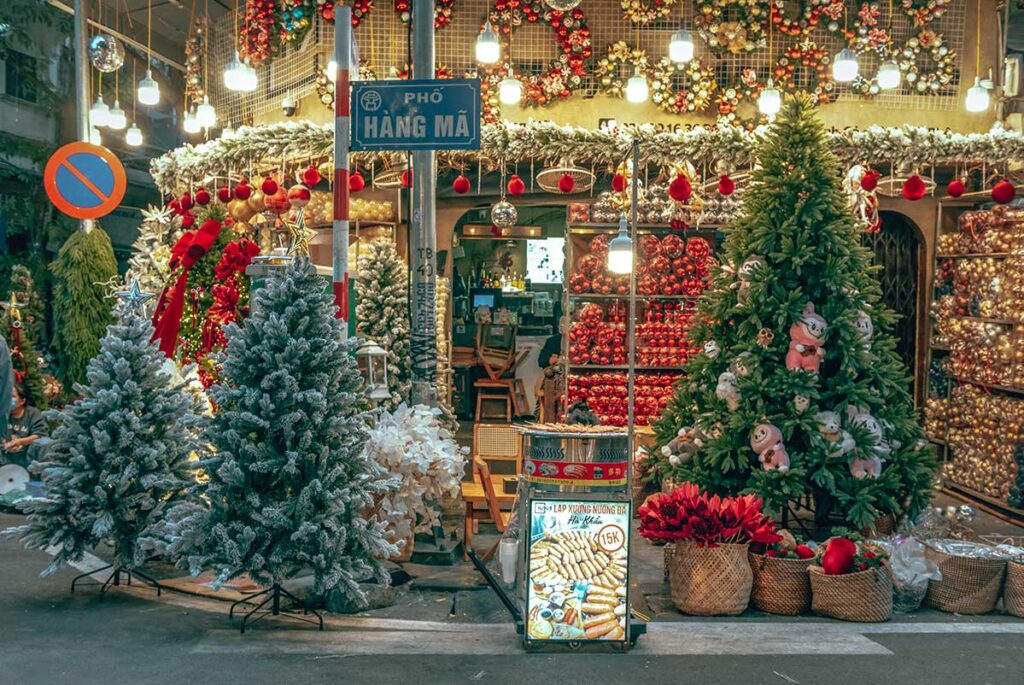
Although Vietnam is not a Christian country, Christmas has become a popular cultural event in Hanoi. Streets and shopping malls are decorated, and churches like St. Joseph’s Cathedral host large masses. Restaurants and hotels often offer special dinners. More here: Christmas in Hanoi.
Western New Year’s Eve (31 December)

While less important than Tet, New Year’s Eve is widely celebrated in Hanoi with concerts, fireworks, and parties, especially around Hoan Kiem Lake. Bars and clubs host events catering to both locals and tourists. More here: New Year’s Eve in Hanoi.
Tips for joining celebrations in Hanoi
Joining local festivals and holidays in Hanoi can be a highlight of your trip, but it helps to know what to expect. These tips will make the experience more enjoyable and help you avoid common surprises.
- Respect religious and ancestor practices
Many celebrations, especially in temples and pagodas, are about worship rather than entertainment. Dress modestly, avoid blocking worshippers during ceremonies, and don’t treat altars or offerings as photo props. - Expect closures during Tet
During Vietnamese New Year, many shops, cafés, and even tourist sites close for several days. Hotels and larger restaurants stay open, but daily life slows down. Plan ahead for meals and transport, and don’t expect everything to run as usual. - Be mindful of crowds
Major festivals like Perfume Pagoda or Mid-Autumn can be extremely crowded. Pickpockets are more active in packed areas, and families with children may find it overwhelming. If you want to see the atmosphere but avoid the crush, go early in the day or stick to side streets. - Street safety
During Ghost Month and Vu Lan, you’ll see people burning joss paper on the streets. Around New Year’s Eve and Tet, firecrackers and lion dances are common. Keep an eye out when walking in busy areas, and be careful around open flames. - Where to best experience Western holidays
Christmas decorations are concentrated around St. Joseph’s Cathedral, shopping malls, and certain Old Quarter streets where every shop sells ornaments. For New Year’s Eve, the biggest countdown and fireworks are usually at Hoan Kiem Lake, where the city organizes concerts and street parties.
